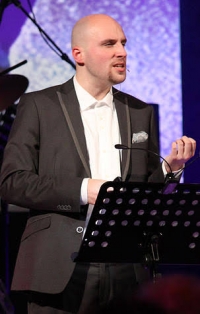Piano Sheet Music
 "... When it came time to hire a guitar player ... I didn't even have to think about it ... Mike Bloomfield was the best guitar player I'd ever heard..." Bob Dylan
"... When it came time to hire a guitar player ... I didn't even have to think about it ... Mike Bloomfield was the best guitar player I'd ever heard..." Bob Dylan
Hoagy Carmichael

Hoagland Howard "Hoagy" Carmichael (November 22, 1899 – December 27, 1981) was an American composer, pianist, singer, actor, and bandleader. He is best known for writing the melody to "Stardust" (1927), one of the most-recorded American songs of all time. Carmichael spelled it "Star Dust", but the space is usually omitted.
Alec Wilder, in his study of the American popular song, concluded that Hoagy Carmichael was the "most talented, inventive, sophisticated and jazz-oriented" of the hundreds of writers composing pop songs in the first half of the 20th century.
Carmichael finished and recorded one of his most famous songs, the sophisticated "Star Dust" (later re-named "Stardust", with lyrics), at the Gennett Records studio in Richmond, Indiana, with Carmichael doing the piano solo. The song, an idiosyncratic melody in medium tempo, actually a song about a song, later became the quintessential American standard, recorded by dozens of artists. Shortly thereafter, Carmichael got bigtime recognition when Paul Whiteman recorded "Washboard Blues", with Carmichael playing and singing, and the Dorsey brothers and Bix Beiderbecke in the orchestra. Despite his growing fame, at this stage Carmichael was still somewhat handicapped by his inability to sight-read and notate music properly, though clearly innovative and talented. With coaching, he soon became more proficient at arranging his own music.
Alec Wilder, in his study of the American popular song, concluded that Hoagy Carmichael was the "most talented, inventive, sophisticated and jazz-oriented" of the hundreds of writers composing pop songs in the first half of the 20th century.
Carmichael finished and recorded one of his most famous songs, the sophisticated "Star Dust" (later re-named "Stardust", with lyrics), at the Gennett Records studio in Richmond, Indiana, with Carmichael doing the piano solo. The song, an idiosyncratic melody in medium tempo, actually a song about a song, later became the quintessential American standard, recorded by dozens of artists. Shortly thereafter, Carmichael got bigtime recognition when Paul Whiteman recorded "Washboard Blues", with Carmichael playing and singing, and the Dorsey brothers and Bix Beiderbecke in the orchestra. Despite his growing fame, at this stage Carmichael was still somewhat handicapped by his inability to sight-read and notate music properly, though clearly innovative and talented. With coaching, he soon became more proficient at arranging his own music.
Morton Gould

Morton Gould (December 10, 1913 – February 21, 1996) was an American composer, conductor, arranger, and pianistMorton Gould was born in Richmond Hill, New York, United States. He was recognized early as a child prodigy with abilities in improvisation and composition. His first composition was published at age six. Gould studied at the Institute of Musical Art in New York. His most important teachers were Abby Whiteside and Vincent Jones.
The Little Mermaid
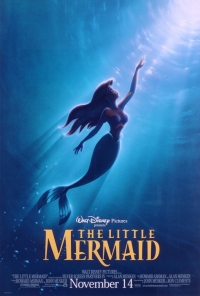
The Little Mermaid is a 1989 animated feature produced by Walt Disney Feature Animation with pencil test began on September 23, 1988 and first released on November 17, 1989 by Walt Disney Pictures with the first Wallace and Gromit short film, A Grand Day Out. The twenty-eighth animated feature in the Disney animated features canon, the film is based on the Hans Christian Andersen fairy tale "The Little Mermaid." During its initial release, it grossed over $84 million in the United States and an additional $99 million internationally.
The film is given credit for breathing life back into the animated feature film genre after a string of critical and commercial failures that had dated to the early 1980s. It also marked the start of the era known as Disney Renaissance.
A stage adaptation of the film with a book by Doug Wright and additional songs by Alan Menken and new lyricist Glenn Slater opened in Denver in July 2007 and began performances on Broadway.
The Little Mermaid: An Original Walt Disney Records Soundtrack is the soundtrack to Disney's 1989 animated feature The Little Mermaid. It contains the songs from the film written by Alan Menken and Howard Ashman, as well as the film's score composed by Alan Menken. The album received the Academy Award for Best Original Score and the Golden Globe Award for Best Original Score.
In October 2006, a new two-disc special edition version of the soundtrack was released to correspond with the two-disc Platinum Edition DVD release of The Little Mermaid. The first disc remains identical to the original release, yet with remastered audio, while the newly added second disc is composed of various newly recorded version of the film's songs by different artists, such as Ashley Tisdale, Raven-Symoné, The Jonas Brothers, and Jessica Simpson. It also includeds two videos, as well as new cover art.
The film is given credit for breathing life back into the animated feature film genre after a string of critical and commercial failures that had dated to the early 1980s. It also marked the start of the era known as Disney Renaissance.
A stage adaptation of the film with a book by Doug Wright and additional songs by Alan Menken and new lyricist Glenn Slater opened in Denver in July 2007 and began performances on Broadway.
The Little Mermaid: An Original Walt Disney Records Soundtrack is the soundtrack to Disney's 1989 animated feature The Little Mermaid. It contains the songs from the film written by Alan Menken and Howard Ashman, as well as the film's score composed by Alan Menken. The album received the Academy Award for Best Original Score and the Golden Globe Award for Best Original Score.
In October 2006, a new two-disc special edition version of the soundtrack was released to correspond with the two-disc Platinum Edition DVD release of The Little Mermaid. The first disc remains identical to the original release, yet with remastered audio, while the newly added second disc is composed of various newly recorded version of the film's songs by different artists, such as Ashley Tisdale, Raven-Symoné, The Jonas Brothers, and Jessica Simpson. It also includeds two videos, as well as new cover art.
Fiddler on the Roof

Fiddler on the Roof is a musical with music by Jerry Bock, lyrics by Sheldon Harnick, and book by Joseph Stein, set in csarist Russia in 1905.
Fiddler on the Roof was originally entitled Tevye. It is based on Tevye and his Daughters (or Tevye the Milkman) and other tales by Sholem Aleichem which he wrote in Yiddish and published in 1894. The story centers on Tevye, the father of five daughters, and his attempts to maintain his family and religious traditions while outside influences encroach upon their lives. He must cope with both the strong-willed actions of his three older daughters—each daughter's choice of husband moves progressively further away from established customs—and with the edict of the Tsar that evicts the Jews from their village.
The musical's title stems from a painting by Marc Chagall, one of many surreal paintings he created of Eastern European Jewish life, often including a fiddler. The Fiddler is a metaphor for survival, through tradition and joyfulness, in a life of uncertainty and imbalance.
The original Broadway production of the show, which opened in 1964, was the first musical to surpass the 3,000 performance mark, and it held the record for longest-running Broadway musical for almost 10 years until Grease surpassed its run. The production earned $1,574 for every dollar invested in it.
The show was highly acclaimed and nominated for ten Tony Awards, winning nine, including Best Musical, score, book, direction and choreography. It spawned four Broadway revivals, a successful 1971 film adaptation, and has enjoyed enduring international popularity. It is also a very popular choice for school and community productions.
Fiddler on the Roof was originally entitled Tevye. It is based on Tevye and his Daughters (or Tevye the Milkman) and other tales by Sholem Aleichem which he wrote in Yiddish and published in 1894. The story centers on Tevye, the father of five daughters, and his attempts to maintain his family and religious traditions while outside influences encroach upon their lives. He must cope with both the strong-willed actions of his three older daughters—each daughter's choice of husband moves progressively further away from established customs—and with the edict of the Tsar that evicts the Jews from their village.
The musical's title stems from a painting by Marc Chagall, one of many surreal paintings he created of Eastern European Jewish life, often including a fiddler. The Fiddler is a metaphor for survival, through tradition and joyfulness, in a life of uncertainty and imbalance.
The original Broadway production of the show, which opened in 1964, was the first musical to surpass the 3,000 performance mark, and it held the record for longest-running Broadway musical for almost 10 years until Grease surpassed its run. The production earned $1,574 for every dollar invested in it.
The show was highly acclaimed and nominated for ten Tony Awards, winning nine, including Best Musical, score, book, direction and choreography. It spawned four Broadway revivals, a successful 1971 film adaptation, and has enjoyed enduring international popularity. It is also a very popular choice for school and community productions.
Michael Buble

Michael Steven Bublé (born 9 September 1975) is a Canadian big band singer. He won several awards, including a Grammy and multiple Juno Awards. While achieving modest chart success in the United States, his 2003 self-titled album has reached the top ten in Lebanon, the UK and his home country. However, he did find commercial success in the U.S. with his 2005 album It's Time. He has sold over 18 million albums. Michael has also appeared on the TV series Rove four times.
The album Michael Bublé was released by Warner Bros. Records just before Valentine's Day in 2003. The album was actually first released by the Warner company in South Africa, where the album went into the Top 5 and was certified Gold. Soon after that, it entered the Canadian album charts. As success in the USA was marginal at best, Bublé started visiting countries all over the world, with the album being successful in places like the Philippines and Singapore. He then moved on to placed like Italy and eventually had chart success in the UK, U.S., Australia and elsewhere soon followed with the album going Platinum and reaching the top ten of the album charts in the UK and Canada and going all the way to #1 in Australia. The album has reached the top 50 of the Billboard 200 album charts in the U.S. His version of George Michael's "Kissing a Fool" was released as a single from the album and reached the top 30 of the Billboard Hot Adult Contemporary Tracks chart. "How Can You Mend a Broken Heart?" reached the top 30 of the Billboard Adult Contemporary chart as well. His third single "Sway" also reached the top 30 of the Adult Contemporary chart, while a Junkie XL remix of the song reached the top 20 in Australia in May 2004.
Bublé's second studio album, It's Time, debuted as a hugely successful performance. The album reached number 7 on the Billboard 200 album chart and number 2 on the ARIA Album Charts in Australia. It's Time also debuted at number 4 on the UK Album Charts. The album features covers of Beatles and Ray Charles songs, and the hit single "Home".
The album Michael Bublé was released by Warner Bros. Records just before Valentine's Day in 2003. The album was actually first released by the Warner company in South Africa, where the album went into the Top 5 and was certified Gold. Soon after that, it entered the Canadian album charts. As success in the USA was marginal at best, Bublé started visiting countries all over the world, with the album being successful in places like the Philippines and Singapore. He then moved on to placed like Italy and eventually had chart success in the UK, U.S., Australia and elsewhere soon followed with the album going Platinum and reaching the top ten of the album charts in the UK and Canada and going all the way to #1 in Australia. The album has reached the top 50 of the Billboard 200 album charts in the U.S. His version of George Michael's "Kissing a Fool" was released as a single from the album and reached the top 30 of the Billboard Hot Adult Contemporary Tracks chart. "How Can You Mend a Broken Heart?" reached the top 30 of the Billboard Adult Contemporary chart as well. His third single "Sway" also reached the top 30 of the Adult Contemporary chart, while a Junkie XL remix of the song reached the top 20 in Australia in May 2004.
Bublé's second studio album, It's Time, debuted as a hugely successful performance. The album reached number 7 on the Billboard 200 album chart and number 2 on the ARIA Album Charts in Australia. It's Time also debuted at number 4 on the UK Album Charts. The album features covers of Beatles and Ray Charles songs, and the hit single "Home".
Mozart

Wolfgang Amadeus Mozart, full name Johann Chrysostom Wolfgang Amadeus Mozart (27 January 1756 â 5 December 1791) was a prolific and influential composer of the Classical era. His over 600 compositions include works widely acknowledged as pinnacles of symphonic, concertante, chamber, piano, operatic, and choral music. Mozart is among the most enduringly popular of classical composers, and many of his works are part of the standard concert repertoire.
Mozart's music, like Haydn's, stands as an archetypal example of the Classical style. His works spanned the period during which that style transformed from one exemplified by the style galant to one that began to incorporate some of the contrapuntal complexities of the late Baroque, complexities against which the galant style had been a reaction. Mozart's own stylistic development closely paralleled the development of the classical style as a whole. In addition, he was a versatile composer and wrote in almost every major genre, including symphony, opera, the solo concerto, chamber music including string quartet and string quintet, and the piano sonata. While none of these genres were new, the piano concerto was almost single-handedly developed and popularized by Mozart. He also wrote a great deal of religious music, including masses; and he composed many dances, divertimenti, serenades, and other forms of light entertainment.
The central traits of the classical style can be identified in Mozart's music. Clarity, balance, and transparency are hallmarks of his work.
Mozart's music, like Haydn's, stands as an archetypal example of the Classical style. His works spanned the period during which that style transformed from one exemplified by the style galant to one that began to incorporate some of the contrapuntal complexities of the late Baroque, complexities against which the galant style had been a reaction. Mozart's own stylistic development closely paralleled the development of the classical style as a whole. In addition, he was a versatile composer and wrote in almost every major genre, including symphony, opera, the solo concerto, chamber music including string quartet and string quintet, and the piano sonata. While none of these genres were new, the piano concerto was almost single-handedly developed and popularized by Mozart. He also wrote a great deal of religious music, including masses; and he composed many dances, divertimenti, serenades, and other forms of light entertainment.
The central traits of the classical style can be identified in Mozart's music. Clarity, balance, and transparency are hallmarks of his work.
The Pussycat Dolls

Pussycat Dolls (abbreviated to PCD) are an American girl group and dance ensemble founded by choreographer Robin Antin in 1995 as a burlesque troupe based in Los Angeles. After attracting national attention, Antin eventually negotiated a record deal with Interscope Records in 2003 turning the group into a music franchise, comprising Nicole Scherzinger alongside Carmit Bachar, Melody Thornton, Jessica Sutta, Ashley Roberts and Kimberly Wyatt. Since then the group has developed a global image and commercial brand overseen by Antin, Interscope and various partners. They have diversified into reality television programs, a Las Vegas act and product endorsements amongst other things.
Success as a music group came in 2005 with their first album PCD which debuted at number five in the US producing three successful singles "Don't Cha", "Buttons", and "Stickwitu"; the latter earned the group a Grammy Award nomination. Following the departure of Carmit Bachar in February 2008, the group continued as a quintet and in September of that year they released their second album, Doll Domination, spawning singles "When I Grow Up", "I Hate This Part" and "Jai Ho! (You Are My Destiny)".
Success as a music group came in 2005 with their first album PCD which debuted at number five in the US producing three successful singles "Don't Cha", "Buttons", and "Stickwitu"; the latter earned the group a Grammy Award nomination. Following the departure of Carmit Bachar in February 2008, the group continued as a quintet and in September of that year they released their second album, Doll Domination, spawning singles "When I Grow Up", "I Hate This Part" and "Jai Ho! (You Are My Destiny)".
Vivaldi

Antonio Lucio Vivaldi (March 4, 1678 â July 28, 1741), nicknamed il Prete Rosso ("The Red Priest"), was a Venetian priest and Baroque music composer, as well as a famous virtuoso violinist; he was born and raised in the Republic of Venice. The Four Seasons, a series of four violin concerti, is his best-known work and a highly popular Baroque piece.
Many of Vivaldi's compositions reflect a flamboyant, almost playful, exuberance. Most of Vivaldi's repertoire was rediscovered only in the first half of the 20th century in Turin and Genoa and was published in the second half. Vivaldi's music is innovative, breaking a consolidated tradition in schemes; he gave brightness to the formal and the rhythmic structure of the concerto, repeatedly looking for harmonic contrasts and innovative melodies and themes. Moreover, Vivaldi was able to compose nonacademic music, particularly meant to be appreciated by the wide public and not only by an intellectual minority. The joyful appearance of his music reveals in this regard a transmissible joy of composing; these are among the causes of the vast popularity of his music. This popularity soon made him famous in other countries such as France which was, at the time, very independent concerning its musical taste.
Vivaldi is considered one of the composers who brought Baroque music (with its typical contrast among heavy sonorities) to evolve into a classical style. Johann Sebastian Bach was deeply influenced by Vivaldi's concertos and arias (recalled in his Johannes Passion, Matthäuspassion, and cantatas). Bach transcribed a number of Vivaldi's concerti for solo keyboard, along with a number for orchestra, including the famous Concerto for Four Violins and Violoncello, Strings and Continuo (RV 580).
Many of Vivaldi's compositions reflect a flamboyant, almost playful, exuberance. Most of Vivaldi's repertoire was rediscovered only in the first half of the 20th century in Turin and Genoa and was published in the second half. Vivaldi's music is innovative, breaking a consolidated tradition in schemes; he gave brightness to the formal and the rhythmic structure of the concerto, repeatedly looking for harmonic contrasts and innovative melodies and themes. Moreover, Vivaldi was able to compose nonacademic music, particularly meant to be appreciated by the wide public and not only by an intellectual minority. The joyful appearance of his music reveals in this regard a transmissible joy of composing; these are among the causes of the vast popularity of his music. This popularity soon made him famous in other countries such as France which was, at the time, very independent concerning its musical taste.
Vivaldi is considered one of the composers who brought Baroque music (with its typical contrast among heavy sonorities) to evolve into a classical style. Johann Sebastian Bach was deeply influenced by Vivaldi's concertos and arias (recalled in his Johannes Passion, Matthäuspassion, and cantatas). Bach transcribed a number of Vivaldi's concerti for solo keyboard, along with a number for orchestra, including the famous Concerto for Four Violins and Violoncello, Strings and Continuo (RV 580).
Savage Garden

Savage Garden was an Australian pop duo that enjoyed major international success between 1997 and 2000. The band was composed of Darren Hayes (vocals) and Daniel Jones (keyboards, sequencing, and guitar). They had a string of hits in the late nineties, and are best remembered today for their ballad "Truly Madly Deeply", which is considered their signature song, and the songs "To the Moon and Back", "I Knew I Loved You", "Crash and Burn", "I Want You" and "Affirmation".
They had sold over 25 million albums and more than 15 million singles around the world, spent five years in the UK album charts despite only two albums released. They had ten Top 40 chart singles in the UK, nine charted Top 20 and four went Top 10. They also performed "Affirmation" as part of the 2000 Sydney Olympic Closing Ceremony.
They had sold over 25 million albums and more than 15 million singles around the world, spent five years in the UK album charts despite only two albums released. They had ten Top 40 chart singles in the UK, nine charted Top 20 and four went Top 10. They also performed "Affirmation" as part of the 2000 Sydney Olympic Closing Ceremony.
The Fray
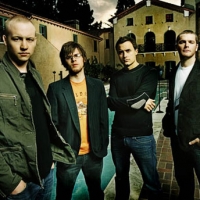
The Fray is a Grammy Award-nominated four-piece piano rock American band from Denver, Colorado. Formed in 2002 by schoolmates Isaac Slade and Joe King, the band released their debut album How to Save a Life in 2005. The band is best known for the song "How to Save a Life", which charted in the top three of the Billboard Hot 100 and was also a top 5 single in Canada, Australia, Ireland, Sweden, and the United Kingdom. The Fray also found national success with the song "Over My Head (Cable Car)", which became a top ten hit in the United States and Canada. How to Save a Life was certified double platinum by the Recording Industry Association of America and was also certified platinum in Australia and New Zealand.
The Fray was formed in 2002, and currently consists of Isaac Slade (vocals and piano), Joe King (guitar and vocals), Dave Welsh (guitar) and Ben Wysocki (drums and percussion). While the band has no official bass guitarist, Dan Lavery of Tonic has been the touring bassist since March 2007. Prior to Dan joining the touring fold, Jimmy Stofer, also a member of the band Hello Kavita, was employed as the band's touring bassist from 2005 through February 2007.
The Fray was formed in 2002, and currently consists of Isaac Slade (vocals and piano), Joe King (guitar and vocals), Dave Welsh (guitar) and Ben Wysocki (drums and percussion). While the band has no official bass guitarist, Dan Lavery of Tonic has been the touring bassist since March 2007. Prior to Dan joining the touring fold, Jimmy Stofer, also a member of the band Hello Kavita, was employed as the band's touring bassist from 2005 through February 2007.
Craig Carnelia

Craig Carnelia (born 1949) is an American musical theater composer and singer, known for his collaboration on the musicals Working and Sweet Smell of Success.
The Ten Commsndments

The Ten Commandments: The Musical is a musical with music by Patrick Leonard and lyrics by Maribeth Derry. The book is adapted from the French musical Les Dix Commandements created by Élie Chouraqui from an idea by Albert Cohen. The musical debuted at the Kodak Theatre in Hollywood on September 21, 2004.
Aqua

Aqua is a Danish dance-pop group, perhaps best known for their 1997 breakthrough single "Barbie Girl". The group formed in 1989, and achieved huge success across the globe in the late 1990s and early 2000s. The group managed to top the UK Singles Chart with their first three singles, a feat few artists have achieved. The group released two albums: Aquarium in 1997 and Aquarius in 2000, before splitting up in July 2001. The group sold an estimated 30 million albums and singles, making them the most successful Danish band ever. The band was formed by Lene Nystrøm Rasted (vocals), Rene Dif (vocals), Søren Rasted (keyboard) and Claus Norreen (guitar).
In their prime, Aqua's singles managed to chart top ten in a number of countries where European pop acts would not normally succeed, including the United States, Australia, and Japan. The group also caused controversy with the double entendres in their "Barbie Girl" single, with the Barbie doll makers Mattel filing a lawsuit against the group. The lawsuit was finally rejected in 2002.
Since their 2001 split, Nystrøm, Dif and Rasted have all achieved solo chart success, and Norreen has continued in the music industry remixing other artists' material.
The group has announced the upcoming release of a compilation album featuring new material, and the four original members have confirmed Aqua will reunite for a tour in 2008. This was confirmed at a press event Friday on October 26, 2007.
In their prime, Aqua's singles managed to chart top ten in a number of countries where European pop acts would not normally succeed, including the United States, Australia, and Japan. The group also caused controversy with the double entendres in their "Barbie Girl" single, with the Barbie doll makers Mattel filing a lawsuit against the group. The lawsuit was finally rejected in 2002.
Since their 2001 split, Nystrøm, Dif and Rasted have all achieved solo chart success, and Norreen has continued in the music industry remixing other artists' material.
The group has announced the upcoming release of a compilation album featuring new material, and the four original members have confirmed Aqua will reunite for a tour in 2008. This was confirmed at a press event Friday on October 26, 2007.
Tchaikovsky

Pyotr Il'yich Tchaikovsky (May 7 1840 â November 6 1893) was a Russian composer of the Romantic era. While not part of the nationalistic music group known as "The Five", Tchaikovsky wrote music which, in the opinion of Harold Schonberg, was distinctly Russian: plangent, introspective, with modally-inflected melody and harmony.
Aesthetically, Tchaikovsky remained open to all aspects of Saint Petersburg musical life. He was impressed by Serov and Balakirev as well as the classical values upheld by the conservatory. Both the progressive and conservative camps in Russian music at the time attempted to win him over. Tchaikovsky charted his compositional course between these two factions, retaining his individuality as a composer as well as his Russian identity. In this he was influenced by the ideals of his teacher Nikolai Rubinstein and Nikolai's brother Anton.
Tchaikovsky's musical cosmopolitanism led him to be favored by many Russian music-lovers over the "Russian" harmonies and styles of Mussorgsky, Borodin and Rimsky-Korsakov.
Nonetheless he frequently adapted Russian traditional melodies and dance forms in his music, which enhanced his success in his home country. The success in St. Petersburg at the premiere of his Third Orchestral Suite may have been due in large part to his concluding the work with a polonaise. He also used a polonaise for the final movement of his Third Symphony.
Aesthetically, Tchaikovsky remained open to all aspects of Saint Petersburg musical life. He was impressed by Serov and Balakirev as well as the classical values upheld by the conservatory. Both the progressive and conservative camps in Russian music at the time attempted to win him over. Tchaikovsky charted his compositional course between these two factions, retaining his individuality as a composer as well as his Russian identity. In this he was influenced by the ideals of his teacher Nikolai Rubinstein and Nikolai's brother Anton.
Tchaikovsky's musical cosmopolitanism led him to be favored by many Russian music-lovers over the "Russian" harmonies and styles of Mussorgsky, Borodin and Rimsky-Korsakov.
Nonetheless he frequently adapted Russian traditional melodies and dance forms in his music, which enhanced his success in his home country. The success in St. Petersburg at the premiere of his Third Orchestral Suite may have been due in large part to his concluding the work with a polonaise. He also used a polonaise for the final movement of his Third Symphony.
Gerry Mulligan

Gerald Joseph Mulligan was an American jazz saxophonist, clarinetist, composer and arranger. Though Mulligan is primarily known as one of the leading jazz baritone saxophonists – playing the instrument ..
Miles Davis

Miles Dewey Davis III (May 26, 1926 – September 28, 1991) was an American trumpeter, bandleader, and composer.
Widely considered one of the most influential musicians of the 20th century, Miles Davis was, with his musical groups, at the forefront of several major developments in jazz music, including bebop, cool jazz, hard bop, modal jazz, and jazz fusion. Many well-known musicians rose to prominence as members of Davis' ensembles, including saxophonists Gerry Mulligan, John Coltrane, Cannonball Adderley, George Coleman, Wayne Shorter, Dave Liebman, Branford Marsalis and Kenny Garrett; trombonist J. J. Johnson; pianists Horace Silver, Red Garland, Wynton Kelly, Bill Evans, Herbie Hancock, Joe Zawinul, Chick Corea, and Keith Jarrett; guitarists John McLaughlin, Pete Cosey, John Scofield and Mike Stern; bassists Paul Chambers, Ron Carter, Dave Holland, Marcus Miller and Darryl Jones ; and drummers Philly Joe Jones, Jimmy Cobb, Tony Williams, Billy Cobham, Jack DeJohnette, and Al Foster.
On October 7, 2008, his album Kind of Blue, released in 1959, received its fourth platinum certification from the RIAA, signifying sales of 4 million copies. Miles Davis was inducted into the Rock and Roll Hall of Fame in 2006. Davis was noted as "one of the key figures in the history of jazz".
On November 5, 2009, Rep. John Conyers of Michigan sponsored a measure in the US House of Representatives to recognize and commemorate the album Kind of Blue on its 50th anniversary. The measure also affirms jazz as a national treasure and "encourages the United States government to preserve and advance the art form of jazz music." It passed, unanimously, with a vote of 409–0 on December 15, 2009.
Widely considered one of the most influential musicians of the 20th century, Miles Davis was, with his musical groups, at the forefront of several major developments in jazz music, including bebop, cool jazz, hard bop, modal jazz, and jazz fusion. Many well-known musicians rose to prominence as members of Davis' ensembles, including saxophonists Gerry Mulligan, John Coltrane, Cannonball Adderley, George Coleman, Wayne Shorter, Dave Liebman, Branford Marsalis and Kenny Garrett; trombonist J. J. Johnson; pianists Horace Silver, Red Garland, Wynton Kelly, Bill Evans, Herbie Hancock, Joe Zawinul, Chick Corea, and Keith Jarrett; guitarists John McLaughlin, Pete Cosey, John Scofield and Mike Stern; bassists Paul Chambers, Ron Carter, Dave Holland, Marcus Miller and Darryl Jones ; and drummers Philly Joe Jones, Jimmy Cobb, Tony Williams, Billy Cobham, Jack DeJohnette, and Al Foster.
On October 7, 2008, his album Kind of Blue, released in 1959, received its fourth platinum certification from the RIAA, signifying sales of 4 million copies. Miles Davis was inducted into the Rock and Roll Hall of Fame in 2006. Davis was noted as "one of the key figures in the history of jazz".
On November 5, 2009, Rep. John Conyers of Michigan sponsored a measure in the US House of Representatives to recognize and commemorate the album Kind of Blue on its 50th anniversary. The measure also affirms jazz as a national treasure and "encourages the United States government to preserve and advance the art form of jazz music." It passed, unanimously, with a vote of 409–0 on December 15, 2009.
Danny Elfman

Daniel Robert "Danny" Elfman (born May 29, 1953) is an American musician, best known for composing music for television and movies, and leading the rock band Oingo Boingo as singer/songwriter from 1976 until its breakup in 1995. He is a frequent collaborator with long-time friend Tim Burton, and has scored all but two of his films. He was nominated for four Academy Awards and won a Grammy Award for Tim Burton's Batman and an Emmy Award for his Desperate Housewives theme. Elfman also wrote the theme for the video game Fable. He is also famous for creating The Simpsons main title theme, and his role as Jack Skellington's singing voice in The Nightmare Before Christmas. He is the Uncle in-law to actress Jenna Elfman.
Ryan Cayabyab
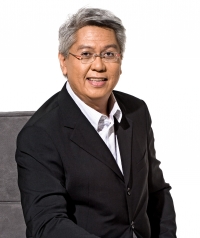
Ryan Cayabyab (born Raymundo Cipriano Pujante Cayabyab on May 4, 1954 in Manila, Philippines but known as Mr. C) is a Filipino musician and was the Executive and Artistic Director of the defunct San Miguel Foundation for the Performing Arts. He was also a resident judge for the only season of Philippine Idol in 2006.
His works range from commissioned full-length ballets, theater musicals, choral pieces, a Mass set to unaccompanied chorus, and orchestral pieces, to commercial recordings of popular music, film scores and television specials.
His works range from commissioned full-length ballets, theater musicals, choral pieces, a Mass set to unaccompanied chorus, and orchestral pieces, to commercial recordings of popular music, film scores and television specials.
Leslie Wagle

she is a female musician doing new age arrangements and cover music.
Franz Schubert

Franz Peter Schubert (German pronunciation: ; January 31, 1797 – November 19, 1828) was an Austrian composer. He wrote some 600 Lieder, nine symphonies (including the famous "Unfinished Symphony"), liturgical music, operas, some incidental music, and a large body of chamber and solo piano music. He is particularly noted for his original melodic and harmonic writing.
Schubert was born into a musical family, and received formal musical training through much of his childhood. While Schubert had a close circle of friends and associates who admired his work (amongst them the prominent singer Johann Michael Vogl), wide appreciation of his music during his lifetime was limited at best. He was never able to secure adequate permanent employment, and for most of his career he relied on the support of friends and family. He made some money from published works, and occasionally gave private musical instruction. In the last year of his life he began to receive wider acclaim. He died at the age of 31 of "typhoid fever", a diagnosis which was vague at the time; several scholars suspect the real illness was tertiary syphilis.
Interest in Schubert's work increased dramatically in the decades following his death. Composers like Franz Liszt, Robert Schumann and Felix Mendelssohn discovered, collected, and championed his works in the 19th century, as did musicologist Sir George Grove. Franz Schubert is now widely considered to be one of the greatest composers in the Western tradition.
Schubert was born into a musical family, and received formal musical training through much of his childhood. While Schubert had a close circle of friends and associates who admired his work (amongst them the prominent singer Johann Michael Vogl), wide appreciation of his music during his lifetime was limited at best. He was never able to secure adequate permanent employment, and for most of his career he relied on the support of friends and family. He made some money from published works, and occasionally gave private musical instruction. In the last year of his life he began to receive wider acclaim. He died at the age of 31 of "typhoid fever", a diagnosis which was vague at the time; several scholars suspect the real illness was tertiary syphilis.
Interest in Schubert's work increased dramatically in the decades following his death. Composers like Franz Liszt, Robert Schumann and Felix Mendelssohn discovered, collected, and championed his works in the 19th century, as did musicologist Sir George Grove. Franz Schubert is now widely considered to be one of the greatest composers in the Western tradition.
Jose Castaneda

Castañeda had the opportunity to train in Paris . When he returned home, Guatemala founded the Ars Nova Orchestra , made up of professionals and amateurs. At the request of President Jorge Ubico -who was his cousin- this orchestra was converted into the official state grouping, having to take the name of "Progressive Orchestra" (1936). After the 1944 Revolution , the orchestra was renamed the National Symphony Orchestra (1945), a name that it has preserved to this day.
A Fine Frenzy

Alison Sudol (born December 23, 1985), known professionally as A Fine Frenzy (formerly Alison Monro She has also been very successful in the charts in Germany, Austria, Switzerland, Poland and France - amongst other countries. Her music has also been featured on numerous television shows as well as having a song on the drama movie Sleepwalking, starring Charlize Theron, Nick Stahl and child actress AnnaSophia Robb.
Alicia Keys

Alicia J. Augello-Cook (born January 25, 1981), and has won numerous awards, including eleven Grammy Awards, seventeen Billboard Music Awards, three American Music Awards.
Her debut album Songs in A Minor was a worldwide success, selling nearly 11 millions albums, and received five Grammy Awards in 2002, with Alicia winning Best New Artist and also Song of the Year for "Fallin'".
Her debut album Songs in A Minor was a worldwide success, selling nearly 11 millions albums, and received five Grammy Awards in 2002, with Alicia winning Best New Artist and also Song of the Year for "Fallin'".
Carl Philipp Emanuel Bach
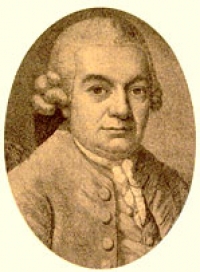
Carl Philipp Emanuel Bach (8 March 1714 – 14 December 1788) was a German musician and composer, the second of three sons of Johann Sebastian Bach and Maria Barbara Bach. He was a crucial composer in the transition between the Baroque and Classical periods, and one of the founders of the Classical style, composing in the Rococo and Classical periods. His second name was given in honor of Georg Philipp Telemann, a friend of Emanuel's father and his godfather.
Through the latter half of the 18th century, the reputation of Emanuel Bach stood very high. Wolfgang Amadeus Mozart said of him, "He is the father, we are the children." The best part of Joseph Haydn's training was derived from a study of his work. Ludwig van Beethoven expressed for his genius the most cordial admiration and regard. This position he owes mainly to his keyboard sonatas, which mark an important epoch in the history of musical form. Lucid in style, delicate and tender in expression, they are even more notable for the freedom and variety of their structural design; they break away altogether from both the Italian and the Viennese schools, moving instead toward the cyclical and improvisatory forms that would become common several generations later.
The content of his work is full of invention and, most importantly, extreme unpredictability, and wide emotional range even within a single work, a style that may be categorised as Empfindsamer Stil. It is no less sincere in thought than polished and felicitous in phrase. He was probably the first composer of eminence who made free use of harmonic colour for its own sake since the time of Lassus, Monteverdi, and Gesualdo. In this way, he compares well with the most important representatives of the First Viennese School. In fact he exerted enormous influence on the North German School of composers, in particular Georg Anton Benda, Bernhard Joachim Hagen, Ernst Wilhelm Wolf, Johann Gottfried Müthel, Friedrich Wilhelm Rust and many others. His influence was not limited to his contemporaries, and extended to Felix Mendelssohn and Carl Maria von Weber.
Through the latter half of the 18th century, the reputation of Emanuel Bach stood very high. Wolfgang Amadeus Mozart said of him, "He is the father, we are the children." The best part of Joseph Haydn's training was derived from a study of his work. Ludwig van Beethoven expressed for his genius the most cordial admiration and regard. This position he owes mainly to his keyboard sonatas, which mark an important epoch in the history of musical form. Lucid in style, delicate and tender in expression, they are even more notable for the freedom and variety of their structural design; they break away altogether from both the Italian and the Viennese schools, moving instead toward the cyclical and improvisatory forms that would become common several generations later.
The content of his work is full of invention and, most importantly, extreme unpredictability, and wide emotional range even within a single work, a style that may be categorised as Empfindsamer Stil. It is no less sincere in thought than polished and felicitous in phrase. He was probably the first composer of eminence who made free use of harmonic colour for its own sake since the time of Lassus, Monteverdi, and Gesualdo. In this way, he compares well with the most important representatives of the First Viennese School. In fact he exerted enormous influence on the North German School of composers, in particular Georg Anton Benda, Bernhard Joachim Hagen, Ernst Wilhelm Wolf, Johann Gottfried Müthel, Friedrich Wilhelm Rust and many others. His influence was not limited to his contemporaries, and extended to Felix Mendelssohn and Carl Maria von Weber.
Carlos Hernani Macchi

arlos Hernani Macchi Real name: Macchi, Carlos Hernani Violinist, flutist and composer(1878 - 13 July 1929) Place of birth:
Argentina do not have precise information about his place of birth and the date he was born but some of the researchers we have consulted state that he was born in Buenos Aires in 1878. His first instrument was the violin. His elder brother taught him the first lessons. By the end of the ninetieth century and beginning of the twentieth they together organized, also with the flutist Luis Teisseire, -the composer of “Entrada prohibida”- and some occasional guitarist -according to Héctor Ernié, one may have been Eusebio Aspiazú (Cieguito)- an orchestra that played at balls at backyards and cheap cafes near the Mercado de Abasto. Some authors also mention the violinist Julián Urdapilleta as sideman.
Argentina do not have precise information about his place of birth and the date he was born but some of the researchers we have consulted state that he was born in Buenos Aires in 1878. His first instrument was the violin. His elder brother taught him the first lessons. By the end of the ninetieth century and beginning of the twentieth they together organized, also with the flutist Luis Teisseire, -the composer of “Entrada prohibida”- and some occasional guitarist -according to Héctor Ernié, one may have been Eusebio Aspiazú (Cieguito)- an orchestra that played at balls at backyards and cheap cafes near the Mercado de Abasto. Some authors also mention the violinist Julián Urdapilleta as sideman.
Final Fantasy X
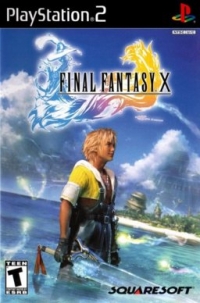
Final Fantasy X (ファイナルファンタジーX Fainaru Fantajī Ten?) is a console role-playing game developed and published by Square (now Square Enix) as the tenth title in the Final Fantasy series. It was released in 2001 for Sony's PlayStation 2. The game marks the Final Fantasy series' transition from entirely pre-rendered backdrops to fully three-dimensional areas, and is also the first in the series to feature voice acting. Final Fantasy X replaces the Active Time Battle (ATB) system with a new Conditional Turn-Based Battle (CTB) system, and uses a new leveling system called the "Sphere Grid".
Set in the fantasy world of Spira, the game's story centers around a group of adventurers and their quest to defeat a rampaging monster known as "Sin". The player character is Tidus, a blitzball star who finds himself in Spira after his home city of Zanarkand is destroyed by Sin. During the game, Tidus, along with several others, aids the summoner Yuna on her pilgrimage to destroy Sin.
Development of Final Fantasy X began in 1999, with a budget of more than US$32.3 million and a team of more than 100 people. The game was the first in the main series not entirely scored by Nobuo Uematsu; Masashi Hamauzu and Junya Nakano were signed as Uematsu's fellow composers. Final Fantasy X was both a critical and commercial success. It was voted by the readers of the Japanese video game magazine Famitsu to be the greatest video game of all-time. As of January 2004, the game has sold 6.6 million units worldwide. In 2003, it was followed by Final Fantasy X-2, making it the first Final Fantasy game to have a direct sequel.
Set in the fantasy world of Spira, the game's story centers around a group of adventurers and their quest to defeat a rampaging monster known as "Sin". The player character is Tidus, a blitzball star who finds himself in Spira after his home city of Zanarkand is destroyed by Sin. During the game, Tidus, along with several others, aids the summoner Yuna on her pilgrimage to destroy Sin.
Development of Final Fantasy X began in 1999, with a budget of more than US$32.3 million and a team of more than 100 people. The game was the first in the main series not entirely scored by Nobuo Uematsu; Masashi Hamauzu and Junya Nakano were signed as Uematsu's fellow composers. Final Fantasy X was both a critical and commercial success. It was voted by the readers of the Japanese video game magazine Famitsu to be the greatest video game of all-time. As of January 2004, the game has sold 6.6 million units worldwide. In 2003, it was followed by Final Fantasy X-2, making it the first Final Fantasy game to have a direct sequel.
Jazz for Seniors

Jazz for Seniors by Carl Poole is 15 progressive duets for jazz-oriented like instruments. A continuation of Jazz for Juniors with more difficult rhythms.
Aaron Copland
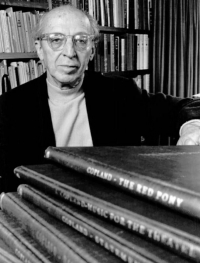
Aaron Copland (/ˈkoʊplənd/, KOHP-lənd; November 14, 1900 – December 2, 1990) was an American composer, composition teacher, writer, and later a conductor of his own and other American music. Copland was referred to by his peers and critics as "the Dean of American Composers". The open, slowly changing harmonies in much of his music are typical of what many people consider to be the sound of American music, evoking the vast American landscape and pioneer spirit.
Holly Johnson

William "Holly" Johnson is an English artist, musician, and writer, best known as the lead vocalist of Frankie Goes to Hollywood, who achieved huge commercial success in the mid-1980s. Prior to that, in the late 1970s he was a bassist for the band Big in Japan.
Ketelbey

Albert William Ketèlbey (9 August, 1875 – 26 November, 1959) was an English composer, conductor and pianist.
Ketèlbey was born in Alma Street in the Lozells area of Birmingham, England, the son of George Ketelbey (written with no accent), and Sarah Aston. At the age of eleven he wrote a piano sonata that won praise from Edward Elgar. Ketèlbey attended the Trinity College of Music in London, where he showed his talent for playing various orchestral instruments reflected in the masterfully colourful orchestration, especially of oriental inspiration, that became his trademark. At Trinity he beat Gustav Holst in competition for a musical scholarship. He used the pseudonyms Raoul Clifford and Anton Vodorinski for some of his earlier works (some reference books mistakenly give Vodorinski as his true name and Ketèlbey as the pseudonym). His name is frequently misspelt Ketelby.
Being appointed musical director of London's Vaudeville Theatre, Ketèlbey continued writing diverse vocal and instrumental music. Later, he became famous for composing lightweight, popular music, much of which was used as accompaniments to silent films, and as mood music at tea dances. Success enabled him to relinquish his London appointments.
Ketèlbey was born in Alma Street in the Lozells area of Birmingham, England, the son of George Ketelbey (written with no accent), and Sarah Aston. At the age of eleven he wrote a piano sonata that won praise from Edward Elgar. Ketèlbey attended the Trinity College of Music in London, where he showed his talent for playing various orchestral instruments reflected in the masterfully colourful orchestration, especially of oriental inspiration, that became his trademark. At Trinity he beat Gustav Holst in competition for a musical scholarship. He used the pseudonyms Raoul Clifford and Anton Vodorinski for some of his earlier works (some reference books mistakenly give Vodorinski as his true name and Ketèlbey as the pseudonym). His name is frequently misspelt Ketelby.
Being appointed musical director of London's Vaudeville Theatre, Ketèlbey continued writing diverse vocal and instrumental music. Later, he became famous for composing lightweight, popular music, much of which was used as accompaniments to silent films, and as mood music at tea dances. Success enabled him to relinquish his London appointments.
Mandy Moore
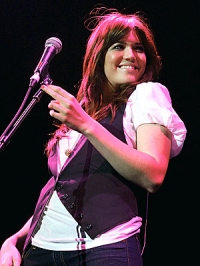
Amanda Leigh "Mandy" Moore (born April 10, 1984) is an American pop singer, songwriter, actress, and fashion designer. She grew up in Florida and came to fame as a teenager in the early 2000s, after the release of her teen-oriented pop albums So Real, I Wanna Be with You, and Mandy Moore. She has branched out into a film career, starring in 2002's A Walk to Remember and later appearing in the lead roles of other movies also aimed at teenage audiences. Two of her later films, American Dreamz and Saved!, were satires in which she portrayed darker characters than in her previous roles. Her private life, including her relationships with tennis player Andy Roddick as well as with actors Wilmer Valderrama and Zach Braff, has been much discussed in the media. Her fifth album, Wild Hope, was released in 2007.
Mussorgsky
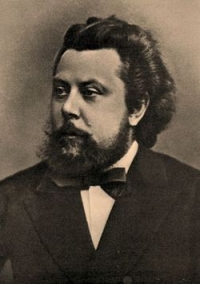
Modest Petrovich Mussorgsky (March 21, 1839 – March 28, 1881), one of the Russian composers known as the Five, was an innovator of Russian music. He strove to achieve a uniquely Russian musical identity, often in deliberate defiance of the established conventions of Western music.
Like his literary contemporary Fyodor Dostoyevsky, Mussorgsky depicts in his music "the insulted and the injured" with all their passion and pain. He raises these characters to tragic heights until the grotesque and majestic coexist. Mussorgsky could accomplish this not simply out of compassion or guilt towards them, but because in his works he almost becomes them. Mussorgsky's music is vivid, confused, feverish and ultimately hypnotizing —again, like Dostoyevsky at his best.
Many of his major works were inspired by Russian history, Russian folklore, and other nationalist themes, including the opera Boris Godunov, the orchestral tone poem Night on Bald Mountain, and the piano suite Pictures at an Exhibition. However, while Mussorgsky's music can be vivid and nationalistic, it does not glorify the powerful and is at times (such as in The Field-Marshal) antimilitaristic. For this reason, it was perceived as being directed against the state and its composer "under suspicion." He, like the others in The Russian Five, were considered dangerous extremists by the emperor and his court. This may have been the reason Tsar Alexander III personally crossed off Boris Godounov from the list of proposed pieces for the imperial opera in 1888.
For many years Mussorgsky's works were mainly known in versions revised or completed by other composers. Many of his most important compositions have recently come into their own in their original forms, and some of the original scores are now also available.
Like his literary contemporary Fyodor Dostoyevsky, Mussorgsky depicts in his music "the insulted and the injured" with all their passion and pain. He raises these characters to tragic heights until the grotesque and majestic coexist. Mussorgsky could accomplish this not simply out of compassion or guilt towards them, but because in his works he almost becomes them. Mussorgsky's music is vivid, confused, feverish and ultimately hypnotizing —again, like Dostoyevsky at his best.
Many of his major works were inspired by Russian history, Russian folklore, and other nationalist themes, including the opera Boris Godunov, the orchestral tone poem Night on Bald Mountain, and the piano suite Pictures at an Exhibition. However, while Mussorgsky's music can be vivid and nationalistic, it does not glorify the powerful and is at times (such as in The Field-Marshal) antimilitaristic. For this reason, it was perceived as being directed against the state and its composer "under suspicion." He, like the others in The Russian Five, were considered dangerous extremists by the emperor and his court. This may have been the reason Tsar Alexander III personally crossed off Boris Godounov from the list of proposed pieces for the imperial opera in 1888.
For many years Mussorgsky's works were mainly known in versions revised or completed by other composers. Many of his most important compositions have recently come into their own in their original forms, and some of the original scores are now also available.
Bach

Johann Sebastian Bach (31 March 1685 – 28 July 1750) was a German composer and organist whose sacred and secular works for choir, orchestra, and solo instruments drew together the strands of the Baroque period and brought it to its ultimate maturity. Although he introduced no new forms, he enriched the prevailing German style with a robust contrapuntal technique, an unrivalled control of harmonic and motivic organisation in composition for diverse musical forces, and the adaptation of rhythms and textures from abroad, particularly Italy and France.
Revered for their intellectual depth and technical and artistic beauty, Bach's works include the Brandenburg concertos; the Goldberg Variations; the English Suites, French Suites, Partitas, and Well-Tempered Clavier; the Mass in B Minor; the St. Matthew Passion; the St. John Passion; The Musical Offering; The Art of Fugue; the Sonatas and Partitas for violin solo; the Cello Suites; more than 200 surviving cantatas; and a similar number of organ works, including the celebrated Toccata and Fugue in D Minor.
While Bach's fame as an organist was great during his lifetime, he was not particularly well-known as a composer. His adherence to Baroque forms and contrapuntal style was considered "old-fashioned" by his contemporaries, especially late in his career when the musical fashion tended towards Rococo and later Classical styles. A revival of interest and performances of his music began early in the 19th century, and he is now widely considered to be one of the greatest composers in the Western tradition.
Revered for their intellectual depth and technical and artistic beauty, Bach's works include the Brandenburg concertos; the Goldberg Variations; the English Suites, French Suites, Partitas, and Well-Tempered Clavier; the Mass in B Minor; the St. Matthew Passion; the St. John Passion; The Musical Offering; The Art of Fugue; the Sonatas and Partitas for violin solo; the Cello Suites; more than 200 surviving cantatas; and a similar number of organ works, including the celebrated Toccata and Fugue in D Minor.
While Bach's fame as an organist was great during his lifetime, he was not particularly well-known as a composer. His adherence to Baroque forms and contrapuntal style was considered "old-fashioned" by his contemporaries, especially late in his career when the musical fashion tended towards Rococo and later Classical styles. A revival of interest and performances of his music began early in the 19th century, and he is now widely considered to be one of the greatest composers in the Western tradition.
Bleach

Ichigo Kurosaki never asked for the ability to see ghosts -- he was born with the gift. When his family is attacked by a Hollow -- a malevolent lost soul -- Ichigo becomes a Soul Reaper, dedicating his life to protecting the innocent and helping the tortured spirits themselves find peace.
Dexter

Dexter Morgan, a man with homicidal tendencies, lives a double life. He works as a forensic technician for the police department during the day and kills heinous perpetrators in his free time.
Robert Schumann
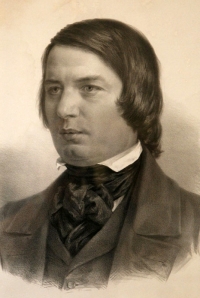
Robert Schumann (German: ; 8 June 1810 – 29 July 1856) was a German composer, pianist, and influential music critic. He is widely regarded as one of the greatest composers of the Romantic era. Schumann left the study of law, intending to pursue a career as a virtuoso pianist. His teacher, Friedrich Wieck, a German pianist, had assured him that he could become the finest pianist in Europe, but a hand injury ended this dream. Schumann then focused his musical energies on composing.
Jacques Brel

Jacques Romain Georges Brel (April 8, 1929 – October 9, 1978) was a Belgian French-speaking singer-songwriter. The quality and style of his lyrics are highly regarded by many leading critics of popular music.
Brel's songs are not especially well known in the English-speaking world except in translation and through the interpretations of other singers, most famously Scott Walker and Judy Collins. Others who have sung his work in English include Marc Almond, Dave Van Ronk, Alex Harvey, David Bowie, Dusty Springfield, The Dresden Dolls, Frank Sinatra, Terry Jacks, Nina Simone, Rod McKuen, The Kingston Trio, Gavin Friday, Jack Lukeman, Dax Riggs and Beirut. In French-speaking countries, Brel is also remembered as an actor and director.
Brel's songs are not especially well known in the English-speaking world except in translation and through the interpretations of other singers, most famously Scott Walker and Judy Collins. Others who have sung his work in English include Marc Almond, Dave Van Ronk, Alex Harvey, David Bowie, Dusty Springfield, The Dresden Dolls, Frank Sinatra, Terry Jacks, Nina Simone, Rod McKuen, The Kingston Trio, Gavin Friday, Jack Lukeman, Dax Riggs and Beirut. In French-speaking countries, Brel is also remembered as an actor and director.
WILLIAM MORRIS

William Morris wrote Masters in This Hall in 1860 and set his lyrics to a French carol tune obtained by his friend, publisher Edmund Sedding, from the organist at ...
Lorie Line

Lorie Line is a pianist and performer from Minneapolis, Minnesota. She has released over 20 albums and tours every year during the Christmas season.
She grew up in Reno, Nevada studying classical piano. At the age of 9, she entered and won annual Statewide competitions until the age of 18, where she enrolled at the University of Nevada, Reno. She received her B.A. in Music, Piano Performance.
Shortly after getting her degree, she and her husband, Tim, relocated to Minneapolis because of his job transfer. Using her piano performance degree, she auditioned for Dayton's and became a full-time pianist, serenading shoppers. It was here (1988-1993) that many fans first came to hear Lorie Line play the piano for the first time. the "shoppers" encouraged Lorie to record her own CD. She did, and became both pianist and vendor at the same time. Little did she know that she was onto something big.
Since then, Lorie Line has turned piano playing into one of the largest independent record companies in the world, Lorie Line Music, Inc. She has sold over 5 million albums, has published over 20 books of music, and has recorded 27 CDs. She, and members of her Pop Chamber Orchestra, performs to 100,000 people on over 85 stages a year. She tours spring, summer, fall and winter.
She grew up in Reno, Nevada studying classical piano. At the age of 9, she entered and won annual Statewide competitions until the age of 18, where she enrolled at the University of Nevada, Reno. She received her B.A. in Music, Piano Performance.
Shortly after getting her degree, she and her husband, Tim, relocated to Minneapolis because of his job transfer. Using her piano performance degree, she auditioned for Dayton's and became a full-time pianist, serenading shoppers. It was here (1988-1993) that many fans first came to hear Lorie Line play the piano for the first time. the "shoppers" encouraged Lorie to record her own CD. She did, and became both pianist and vendor at the same time. Little did she know that she was onto something big.
Since then, Lorie Line has turned piano playing into one of the largest independent record companies in the world, Lorie Line Music, Inc. She has sold over 5 million albums, has published over 20 books of music, and has recorded 27 CDs. She, and members of her Pop Chamber Orchestra, performs to 100,000 people on over 85 stages a year. She tours spring, summer, fall and winter.
Felix Mendelssohn Bartholdy

Jakob Ludwig Felix Mendelssohn Bartholdy, born and widely known as Felix Mendelssohn, was a German composer, pianist, organist and conductor of the early Romantic period. Mendelssohn's compositions include symphonies, concertos, piano music and chamber music.
Guns N' Roses

Guns N 'Roses is an American rock band founded in 1985 in Los Angeles, California. Axl Rose, Slash, Izzy Stradlin, Duff McKagan, and Steven , Genres: Hard rock, Heavy metal, Blues rock, Glam rock They started their music life in Los Angeles, California, USA (1985) Albums: Appetite for Destruction, Use Your Illusion I
Edward weiss

New York, Sept 6, 1892; d New York, Sept 28, 1984). American pianist . Born into a musical German-Nordic family, he grew up in Europe and studied in Berlin with Alexander Rihm and Xaver Scharwenka, through whom he was introduced to Busoni.
Marcos Witt
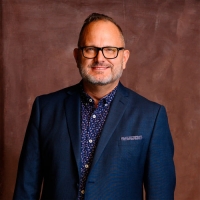
Marcos Witt is an American Christian music singer and pastor. Witt is considered the most influential and famous Spanish speaking figure of Christian music. Nola Witt continued the mission work after his death. Some years later, she married Frank Warren. Together, they began to build new churches in Durango, Mexico. The couple had two children.
Jonathan Reid Gealt

Jonathan Reid Gealt was born in Glens Falls Hospital and grew up in the small upstate town of Queensbury, New York. He attended the Boston Conservatory and graduated with a Bachelor of Fine Arts in Musical Theater Performance, having a dual emphasis in both dance and composition.
Saturday Night Fever
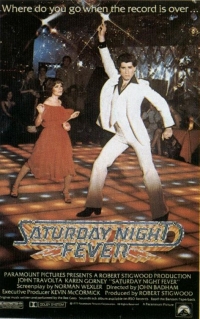
Saturday Night Fever is a 1977 film starring John Travolta as Tony Manero, a troubled Brooklyn youth whose weekend activities are dominated by visits to a local discothèque. While in the disco, Tony is the king, and the visits help him to temporarily forget the reality of his life: a dead-end job, clashes with his unsupportive and squabbling parents, tensions in the local community, and his associations with a gang of dead-beat friends.
A huge commercial success, the movie significantly helped to popularize disco music around the world and made Travolta a household name. The Saturday Night Fever soundtrack, featuring disco songs by the Bee Gees, became the best selling soundtrack at that time and held the record until 1999 when soundtrack to The Bodyguard overtook it. The film is also notable for being one of the first instances of cross-media marketing, with the tie-in soundtrack's single being used to help promote the film before its release and the film popularizing the entire soundtrack after its release.
The story is based upon a 1976 New York magazine article by British writer Nik Cohn, "Tribal Rites of the New Saturday Night." In the late-1990s, Cohn acknowledged that the article had been fabricated. A newcomer to the United States and a stranger to the disco lifestyle, Cohn was unable to make any sense of the subculture he had been assigned to write about. The characters who were to become Tony Manero and his friends sprang almost completely from his imagination. The film also showcased aspects of the music, the dancing, and the subculture surrounding the disco era: symphony-orchestrated melodies, haute-couture styles of clothing, sexual promiscuity, and graceful choreography.
A huge commercial success, the movie significantly helped to popularize disco music around the world and made Travolta a household name. The Saturday Night Fever soundtrack, featuring disco songs by the Bee Gees, became the best selling soundtrack at that time and held the record until 1999 when soundtrack to The Bodyguard overtook it. The film is also notable for being one of the first instances of cross-media marketing, with the tie-in soundtrack's single being used to help promote the film before its release and the film popularizing the entire soundtrack after its release.
The story is based upon a 1976 New York magazine article by British writer Nik Cohn, "Tribal Rites of the New Saturday Night." In the late-1990s, Cohn acknowledged that the article had been fabricated. A newcomer to the United States and a stranger to the disco lifestyle, Cohn was unable to make any sense of the subculture he had been assigned to write about. The characters who were to become Tony Manero and his friends sprang almost completely from his imagination. The film also showcased aspects of the music, the dancing, and the subculture surrounding the disco era: symphony-orchestrated melodies, haute-couture styles of clothing, sexual promiscuity, and graceful choreography.
Beethoven

Ludwig van Beethoven (16 December 1770 - 26 March 1827) was a German composer and pianist. He was a crucial figure in the transitional period between the Classical and Romantic eras in Western classical music, and remains one of the most respected and influential composers of all time.
Born in Bonn, then in the Electorate of Cologne (now in modern-day Germany), he moved to Vienna in his early twenties and settled there, studying with Joseph Haydn and quickly gaining a reputation as a virtuoso pianist. Beethoven's hearing gradually deteriorated beginning in his twenties, yet he continued to compose masterpieces, and to conduct and perform, even after he was completely deaf.
Born in Bonn, then in the Electorate of Cologne (now in modern-day Germany), he moved to Vienna in his early twenties and settled there, studying with Joseph Haydn and quickly gaining a reputation as a virtuoso pianist. Beethoven's hearing gradually deteriorated beginning in his twenties, yet he continued to compose masterpieces, and to conduct and perform, even after he was completely deaf.
Jules Massenet
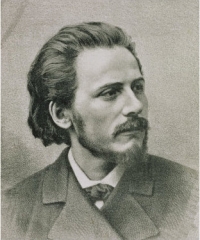
Jules (Émile Frédéric) Massenet (May 12, 1842 – August 13, 1912) was a French composer best known for his operas. His compositions were very popular in the late 19th and early 20th centuries, and he ranks as one of the greatest melodists of his era. Soon after his death, Massenet's style went out of fashion, and many of his operas fell into almost total oblivion. Apart from Manon and Werther, his works were rarely performed. However, since the mid-1970s, many operas of his such as Thaïs and Esclarmonde have undergone periodic revivals.
Billy Joel

William Martin Joel (born May 9, 1949) is an American pianist and singer-songwriter. He released his first hit song, "Piano Man", in 1973. According to the RIAA, he is the sixth best-selling recording artist in the United States.
Joel had Top 10 hits in the '70s, '80s, and '90s; is a six-time Grammy Award winner, and has sold in excess of 150 million albums worldwide. He was inducted into the Songwriter's Hall of Fame (Class of 1992), the Rock and Roll Hall of Fame (Class of 1999), and the Long Island Music Hall of Fame (Class of 2006). Joel "retired" from recording pop music in 1993 but continued to tour (sometimes with Elton John). In 2001 he subsequently released Fantasies & Delusions, a CD of classical compositions for piano. In 2007 he returned to recording with a single entitled "All My Life," followed by an extensive "World Tour" from 2006-2008, covering many of the major world cities.
Joel had Top 10 hits in the '70s, '80s, and '90s; is a six-time Grammy Award winner, and has sold in excess of 150 million albums worldwide. He was inducted into the Songwriter's Hall of Fame (Class of 1992), the Rock and Roll Hall of Fame (Class of 1999), and the Long Island Music Hall of Fame (Class of 2006). Joel "retired" from recording pop music in 1993 but continued to tour (sometimes with Elton John). In 2001 he subsequently released Fantasies & Delusions, a CD of classical compositions for piano. In 2007 he returned to recording with a single entitled "All My Life," followed by an extensive "World Tour" from 2006-2008, covering many of the major world cities.
Chopin

Frédéric Chopin (1 March 1810 – 17 October 1849) was a Polish composer and virtuoso pianist of the Romantic period. He is widely regarded as the greatest Polish composer, and ranks as one of music's greatest tone poets.
He was born in the village of Żelazowa Wola, in the Duchy of Warsaw, to a Polish mother and French-expatriate father, and in his early life was regarded as a child-prodigy pianist. In November 1830, at the age of 20, Chopin went abroad; following the suppression of the Polish November Uprising of 1830–31, he became one of many expatriates of the Polish "Great Emigration."
In Paris, he made a comfortable living as a composer and piano teacher, while giving few public performances. A Polish patriot,
Chopin's extant compositions were written primarily for the piano as a solo instrument. Though technically demanding, Chopin's style emphasizes nuance and expressive depth rather than virtuosity. Chopin invented musical forms such as the ballade and was responsible for major innovations in forms such as the piano sonata, waltz, nocturne, étude, impromptu and prelude. His works are mainstays of Romanticism in 19th-century classical music.
He was born in the village of Żelazowa Wola, in the Duchy of Warsaw, to a Polish mother and French-expatriate father, and in his early life was regarded as a child-prodigy pianist. In November 1830, at the age of 20, Chopin went abroad; following the suppression of the Polish November Uprising of 1830–31, he became one of many expatriates of the Polish "Great Emigration."
In Paris, he made a comfortable living as a composer and piano teacher, while giving few public performances. A Polish patriot,
Chopin's extant compositions were written primarily for the piano as a solo instrument. Though technically demanding, Chopin's style emphasizes nuance and expressive depth rather than virtuosity. Chopin invented musical forms such as the ballade and was responsible for major innovations in forms such as the piano sonata, waltz, nocturne, étude, impromptu and prelude. His works are mainstays of Romanticism in 19th-century classical music.
Hank Mobley

Henry "Hank" Mobley, Amerikalı hard bop ve soul jazz saksofoncusu. Leonard Feather tarafından "tenor saksofonunu orta şiddette en iyi çalan müzisyen" olarak tanımlanmıştır. No Room for Squares ve A Caddy for Daddy adlı albümlerle tanınmıştır.
Meat Loaf
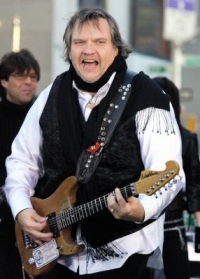
Michael Lee Aday (born Marvin Lee Aday; September 27, 1947), better known by his stage name Meat Loaf, is an American rock musician and actor of stage and screen. He is noted for the Bat out of Hell album trilogy that he created consisting of Bat out of Hell, Bat out of Hell II: Back into Hell, and Bat out of Hell III: The Monster Is Loose and several famous songs from popular films. The Neverland Express is the name of the band he fronts as its lead singer. In 2001, he changed his first name to Michael. Despite setbacks (including multiple bankruptcies), Meat Loaf has had a successful music career, spawning some of the largest-selling albums, and breaking several records for chart duration. Bat out of Hell, the debut album which had been four years in the making, has sold over 37 million copies. After almost 30 years, it still sells an estimated 200,000 copies annually, and stayed on the charts for over 9 years. Each of the seven tracks on the album eventually charted as a hit single.
Although he enjoyed success with Bat out of Hell and Bat out of Hell II: Back into Hell, Meat Loaf experienced some initial difficulty establishing a steady career within his native United States; however, he has retained iconic status and popularity in Europe, especially the UK, where he ranks 23rd for number of weeks overall spent on the charts, and is one of only two artists with an album never to have left the music charts. With the help of his New York collection of musicians — John Golden, Richard Raskin and Paul Jacobs — his European tours enjoyed immense popularity in the 1980s. In Germany, Meat Loaf became notably popular following the release of Bat out of Hell II but has enjoyed most of his success among pop/rock fans. He ranked 96th on VH1's '100 Greatest Artists of Hard Rock'.
Although he enjoyed success with Bat out of Hell and Bat out of Hell II: Back into Hell, Meat Loaf experienced some initial difficulty establishing a steady career within his native United States; however, he has retained iconic status and popularity in Europe, especially the UK, where he ranks 23rd for number of weeks overall spent on the charts, and is one of only two artists with an album never to have left the music charts. With the help of his New York collection of musicians — John Golden, Richard Raskin and Paul Jacobs — his European tours enjoyed immense popularity in the 1980s. In Germany, Meat Loaf became notably popular following the release of Bat out of Hell II but has enjoyed most of his success among pop/rock fans. He ranked 96th on VH1's '100 Greatest Artists of Hard Rock'.
Edward MacDowell
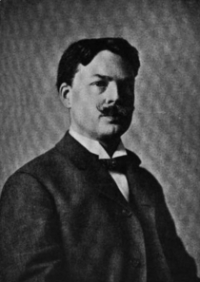
Edward Alexander MacDowell (December 18, 1860 – January 23, 1908) was an American composer and pianist of the Romantic period. He was best known for his second piano concerto and his piano suites "Woodland Sketches", "Sea Pieces", and "New England Idylls". "Woodland Sketches" includes his most popular short piece, "To a Wild Rose". In 1904 he was one of the first seven Americans honored by membership in the American Academy of Arts and Letters.
Samuel Webbe

Samuel Webbe (1740 – 25 May 1816) was an English composer.Born in Menorca in 1740, Webbe was brought up in London. His father died when he was still an infant, and his mother returned to London where she raised Webbe in difficult circumstances. At the age of 11 he was apprenticed to a cabinet maker, and during the first year of his apprenticeship his mother died.Webbe was an autodidact. He first discovered his aptitude for music when called on to repair the case of a harpsichord. During the course of the repair work he taught himself to play the instrument. Near the end of the job he was overheard playing it. As a result of this incident he turned to the study of music under Carl Barbandt.
Sixpence None the Richer

Sixpence None the Richer (Shorter: Sixpence N.T.R.) is a Grammy-nominated American Christian pop/rock band that formed in New Braunfels, Texas, eventually settling in Nashville, Tennessee. The name of the band is inspired by a passage in writer C. S. Lewis's Mere Christianity.
In 1997, the group signed to Steve Taylor's label Squint Entertainment and released a self-titled album, which slowly began garnering attention from a wider audience in the mainstream industry. Although Placencio played bass on most of the album, he left the band before it was released and was replaced by Justin Carry, who joined the band around the same time as second guitarist Sean Kelly.
In 1999, "Kiss Me" was released as a single, propelling Sixpence None the Richer into the national pop spotlight. That year the song was also featured in the film She's All That as the newly made-over protagonist, Laney Boggs, is revealed, and again at the end, during the film's credits. In 2001 the film Not Another Teen Movie would use the song in a parody of that scene. "Kiss Me" was also played on the WB teen drama Dawson's Creek in episodes #2-06 "The Dance" and #2-18 "The Perfect Wedding," and is found on the show's first soundtrack CD, Songs from Dawson's Creek (Volume 1).
In 1999, the band recorded a cover of The La's' "There She Goes", which became their second hit single. This recording was subsequently added to the band's self-titled album in the US, though it had already appeared on all copies of the album internationally.
Current members:
Matt Slocum – Guitar, cello
Leigh Nash – Vocals
Justin Cary – Bass
In 1997, the group signed to Steve Taylor's label Squint Entertainment and released a self-titled album, which slowly began garnering attention from a wider audience in the mainstream industry. Although Placencio played bass on most of the album, he left the band before it was released and was replaced by Justin Carry, who joined the band around the same time as second guitarist Sean Kelly.
In 1999, "Kiss Me" was released as a single, propelling Sixpence None the Richer into the national pop spotlight. That year the song was also featured in the film She's All That as the newly made-over protagonist, Laney Boggs, is revealed, and again at the end, during the film's credits. In 2001 the film Not Another Teen Movie would use the song in a parody of that scene. "Kiss Me" was also played on the WB teen drama Dawson's Creek in episodes #2-06 "The Dance" and #2-18 "The Perfect Wedding," and is found on the show's first soundtrack CD, Songs from Dawson's Creek (Volume 1).
In 1999, the band recorded a cover of The La's' "There She Goes", which became their second hit single. This recording was subsequently added to the band's self-titled album in the US, though it had already appeared on all copies of the album internationally.
Current members:
Matt Slocum – Guitar, cello
Leigh Nash – Vocals
Justin Cary – Bass
Luigi Denza

Luigi Denza (24 February 1846 - 26 January 1922), was an Italian composer. Denza was born at Castellammare di Stabia, near Naples. He studied music under Saverio Mercadante and Paolo Serrao at the Naples Conservatory. Later, he moved to London and became a professor of singing at the Royal Academy of Music in 1898. Denza wrote an opera, Wallenstein, and hundreds of songs. The most popular of these was a collaboration with Peppino Turco, the Neapolitan song Funiculì, Funiculà, about the Vesuvius funicular. Other songs such as "Luna fedel", "Occhi di fata", and "Se" have been sung by Mario Lanza, Luciano Pavarotti, Carlo Bergonzi, Enrico Caruso and Ronan Tynan.
Luigi Denza died in 1922 in London.
Luigi Denza died in 1922 in London.
 Sheet Music 365 is a site for those who wants to access popular sheet music easily,
letting them download the sheet music for free for trial purposes.
It's completely free to download and try the listed sheet music, but you have to delete the files after 24 hours of trial.
Don't forget, if you like the piece of music you have just learned playing,
treat the artist with respect, and go buy the original sheet music.
Sheet Music 365 is a site for those who wants to access popular sheet music easily,
letting them download the sheet music for free for trial purposes.
It's completely free to download and try the listed sheet music, but you have to delete the files after 24 hours of trial.
Don't forget, if you like the piece of music you have just learned playing,
treat the artist with respect, and go buy the original sheet music.

